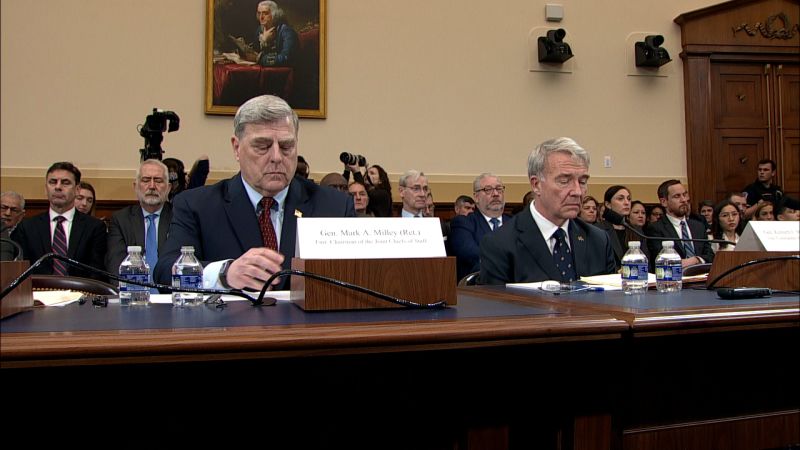The two senior generals in charge of the US military during the withdrawal from Afghanistan in 2021 both blamed the State Department for not sooner ordering a “noncombatant evacuation operation” for remaining US citizens in Afghanistan in a congressional hearing on Tuesday.
The two senior generals in charge of the US military during the withdrawal from Afghanistan in 2021 both blamed the State Department for not sooner ordering a “noncombatant evacuation operation” for remaining US citizens in Afghanistan in a congressional hearing on Tuesday.
“It is my assessment that that decision came too late,” retired Gen. Mark Milley, former Joint Chiefs chairman, said at the House Foreign Affairs Committee hearing.
Retired Gen. Kenneth F. McKenzie, former commander of US Central Command, said that “the events of mid- and late August 2021 were the direct result of delaying the initiation of the NEO (evacuation) for several months, in fact, until we were in extremis, and the Taliban had overrun the country.”
Milley said the consensus military recommendation to the Biden administration was to evacuate US Embassy personnel from Kabul at the same time as the military forces were withdrawing.
“After the decisions were made to keep a diplomatic presence there, as the situation deteriorated through the summer and the fall in the provincial capitals, etc., we were clearly pressing for early calls to execute a NEO,” said Milley.
McKenzie also accused the US Embassy in Kabul of obstructing coordination on a possible evacuation plan with the military.
“Embassy Kabul had a plan, had what we would call an F-77 list, which is the list of US citizens and their families that are in the country, and we struggled to gain access to that plan and work with them over the months of July until we finally got a decision to execute the NEO, which, as I’ve already mentioned, occurred on the 14th of August,” said McKenzie.
Rep. Michael McCaul, the Republican chair of the committee, has repeatedly called for accountability from the Biden administration on how the withdrawal from Afghanistan played out. He has slammed the administration for the Abbey Gate bombing, which killed 13 US service members in the final chaotic days of the withdrawal. The blast also killed scores of Afghan civilians who were desperate to get into the walled-off airport complex.
“I think somebody needs to be held accountable,” McCaul told CNN’s Wolf Blitzer Tuesday morning. “In what form that takes, we’ll see where the evidence goes in the matter.”
In January 2023, McCaul launched a separate investigation into the Afghanistan withdrawal, an effort he says is ongoing. McCaul said many of the families of the service members killed in the Abbey Gate bombing will be at the hearing.
“They are not happy with this president. They don’t think he’s ever publicly apologized to them or even stated the names of their deceased, the fallen, their children who were killed that fateful day,” he said.
The hearing comes as US Central Command recently completed an additional review of the Abbey Gate bombing. The review was announced by CENTCOM in September, just days after an emotional congressional roundtable where family members of the troops killed made clear their anger and what they saw as a lack of accountability over the chaotic withdrawal. It included additional interviews with service members and other personnel who were not included in the initial review of the withdrawal.
The new review included more than 50 interviews, including with 12 US troops who were not part of the original effort. The new interviews sought “any new information surrounding the [Abbey Gate] attack” and whether it would affect the findings of the first investigation, completed in November 2021, Central Command said in a statement last week.
This is not the first time Milley and McKenzie have testified together about the withdrawal from Afghanistan. On September 28, 2021, less than a month after the final withdrawal of US forces from Kabul’s international airport, Milley and McKenzie sat before the Senate Armed Services Committee.
The two men – at the time, the top US general and the top US commander in the Middle East – said they recommended keeping a small US military footprint in Afghanistan. Milley said he suggested keeping between 2,500 and 4,500 US troops in Afghanistan “until conditions were met for further reduction.” That recommendation, he noted, was consistent across the Trump and Biden administrations.
McKenzie said 2,500 US troops was an “appropriate number to remain.” He also issued a warning of what might happen if US troop levels dropped even lower. “If we went below that number, in fact, we would probably witness a collapse of the Afghan government and the Afghan military.”
Maintaining a troop level of 2,500 would have been a fraction of the US force posture in Afghanistan during two decades of war, numbers that peaked at about 100,000 US troops in 2011
Read the full article here





